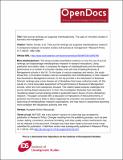| dc.contributor.author | Nightingale, Paul | |
| dc.contributor.author | O’Hare, Alice | |
| dc.contributor.author | Leydesdorff, Loet | |
| dc.contributor.author | Rafols, Ismael | |
| dc.contributor.author | Stirling, Andrew | |
| dc.date.accessioned | 2014-04-28T10:48:30Z | |
| dc.date.available | 2014-04-28T10:48:30Z | |
| dc.date.issued | 2012-09-01 | |
| dc.identifier.citation | Rafols, Ismael, et al. "How journal rankings can suppress interdisciplinary research: A comparison between innovation studies and business & management." Research Policy 41.7 (2012): 1262-1282. | en_GB |
| dc.identifier.issn | 0048-7333 | |
| dc.identifier.uri | https://opendocs.ids.ac.uk/opendocs/handle/20.500.12413/3846 | |
| dc.description.abstract | This study provides quantitative evidence on how the use of journal rankings can disadvantage interdisciplinary research in research evaluations. Using publication and citation data, it compares the degree of interdisciplinarity and the research performance of a number of Innovation Studies units with that of leading Business & Management schools in the UK. On the basis of various mappings and metrics, this study shows that: (i) Innovation Studies units are consistently more interdisciplinary in their research than Business & Management schools; (ii) the top journals in the Association of Business Schools’ rankings span a less diverse set of disciplines than lower-ranked journals; (iii) this results in a more favourable assessment of the performance of Business & Management schools, which are more disciplinary-focused. This citation-based analysis challenges the journal ranking-based assessment. In short, the investigation illustrates how ostensibly ‘excellence-based’ journal rankings exhibit a systematic bias in favour of mono-disciplinary research. The paper concludes with a discussion of implications of these phenomena, in particular how the bias is likely to affect negatively the evaluation and associated financial resourcing of interdisciplinary research organisations, and may result in researchers becoming more compliant with disciplinary authority over time. | en_GB |
| dc.description.sponsorship | ESRC | en_GB |
| dc.language.iso | en | en_GB |
| dc.publisher | Elsevier | en_GB |
| dc.rights | NOTICE: this is the author’s version of a work that was accepted for publication in Research Policy. Changes resulting from the publishing process, such as peer review, editing, corrections, structural formatting, and other quality control mechanisms may not be reflected in this document. Changes may have been made to this work since it was submitted for publication. A definitive version was subsequently published in Research Policy, 41.7 (2012), DOI http://dx.doi.org/10.1016/j.respol.2012.03.015 | en_GB |
| dc.rights.uri | http://www.ids.ac.uk/files/dmfile/IDSOpenDocsStandardTermsOfUse.pdf | en_GB |
| dc.title | How journal rankings can suppress interdisciplinarity. The case of innovation studies in business and management | en_GB |
| dc.type | Article | en_GB |
| dc.rights.holder | Elsevier | en_GB |
| dc.identifier.externaluri | http://dx.doi.org/10.1016/j.respol.2012.03.015 | en_GB |

